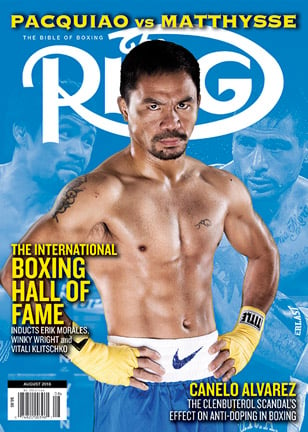
May 12, Madison Square Garden, New York
Next time you use up a roll of toilet paper, save the tube. Save the tube from the next one also (you could speed this up by flinging the TP into the branches of your neighbor’s trees). Now tape those tubes to your face, one on each eye, go pick a fight (here comes your neighbor now, in fact) and prepare to get smacked silly. That’s probably about what it’s like getting in the ring with Vasiliy Lomachenko.
Lomachenko’s ability to step – teleport, more like – to his opponents’ sides and punch before they can reset is so advanced as to render peripheral vision obsolete. And even when he does stay in sight, with each round his movements fall so into sync with whomever he’s facing that it’s like he already knows the script. Boxers of the future, if they hope to avoid becoming victims, will need to invent an entirely new kind of awareness to deal with him.
But the reservoir of superlatives was drained long ago in describing Lomachenko. Jorge Linares introduced the word “vulnerable” into the conversation in the sixth round of their lightweight championship fight with a straight right that caught the Ukrainian phenom flush on the face and dropped him for the first time in his career.
Making his debut at 135 pounds after winning titles at both 130 and 126, Loma pressed the reigning RING and WBA champion from the outset, but the larger Venezuelan responded with some outstanding bodyshots and uppercuts to keep the early rounds close. Going into the sixth, however, the momentum was settling into Loma’s corner. His combinations were getting more ridiculous, he was darting around the blue canvas like a waterbug and his energy was ramping up to the now-familiar cockiness that signals the end of fight night and the beginning of playtime. And hubris is perhaps what compelled him to walk straight into that perfectly timed punch from Linares, who it suddenly seemed had been patiently waiting for his moment.
Lomachenko came out for the seventh a different fighter, conservative and tentative to engage, which Linares exploited in trying to take control of the fight’s narrative. It seemed like the king might retain his crown.
And then came the cut. Linares’ bane – his own frail epidermis – sabotaged him as it has in so many previous fights, this time above his left eye, and the blood began to flow. It was like shoving ammonia into Lomachenko’s nostrils, and from that point on, Linares was safe from no angle. His face red and swollen, the Venezuelan charged out hard in the 10th, but his advantage had been lost. Lomachenko was back in the zone, and nothing could’ve protected his opponent’s liver from the viper-quick left hook that lanced into his side with surgical accuracy. Linares collapsed. He made it back to his feet but couldn’t stand straight due to the obvious pain radiating from his gut, and referee Ricky Gonzalez waved the fight off at 2:08. The scorecards would reveal, probably crushing Linares (44-4, 27 KOs) but elevating his reputation at the same time, that one judge had him ahead, 86-84, another had scored it the same for Lomachenko and the third had it even at 85 apiece.
So Lomachenko (11-1, 9 KOs), the new champ at 135 pounds, had done it again. He had asked for the biggest challenge available and had succeeded in mesmerizing fashion, this time witnessed by an average audience of 1.44 million on ESPN.
In 2014, Lomachenko lost a split decision in what was essentially a rules-optional, “this ain’t the amateurs” hazing by Orlando Salido in Vasiliy’s second pro fight. He learned from that. What do you bet he does the same with the Linares knockdown in just his 12th pro fight? Hard proof could be near. We’ll see Loma again on August 25 in Inglewood, California, opponent to be determined, but after that the hope is that promotional factions can be united with enough money to put him in the ring with Mikey Garcia, whose cold-blooded technique and power would make him the most daunting challenge yet.
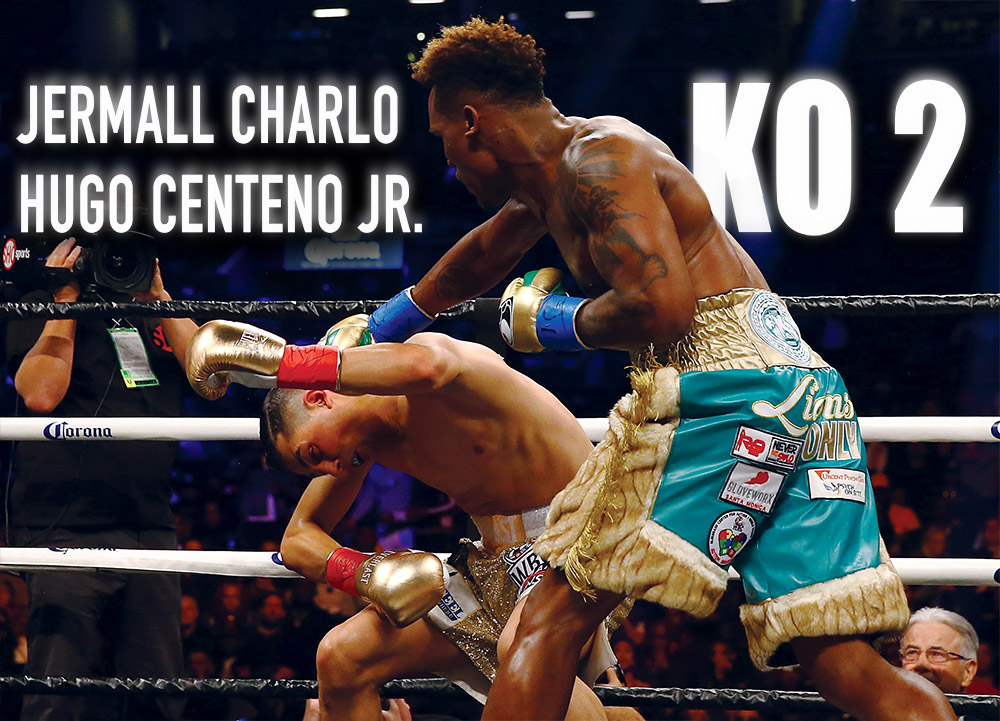 April 21, Barclays Center, Brooklyn, New York
April 21, Barclays Center, Brooklyn, New York
Last October it was Jermell Charlo who stamped his KTFO rewards card with a first-round droppage of Erickson Lubin to retain his 154-pound title. In April, it was Jermell’s twin brother, Jermall, who reminded us that demolition is a family business, capping his second fight at middleweight with a second-round knockout of Hugo Centeno Jr.
Much like his brother’s win, not much happened before the hammer(s) came down. The first round was uneventful, but in Round 2, the former junior middleweight titleholder from Texas power-jabbed Centeno into reverse halfway across the ring before catching him on the chin with a right hand that launched the final salvo. Centeno was still connected to his senses but Charlo wasn’t about to let him back in, and after a couple more rights he slammed the Californian’s temple with a left hook that put him into freefall, then nailed him into the canvas with a straight right for good measure. Referee Steve Willis unnecessarily delivered the entire 10-count.
With the win, Charlo (27-0, 21 KOs) claimed his place in the line to face Gennady Golovkin as the WBC mandatory. The post-fight interview orbited around what has become the most noxious turd in boxing (seriously, we can’t actually be expected to keep shrugging this off as “just a part of the game”) as Charlo was asked about the network and promoter rifts that could prevent the fight from happening. His reply was basically “You guys figure it out.”
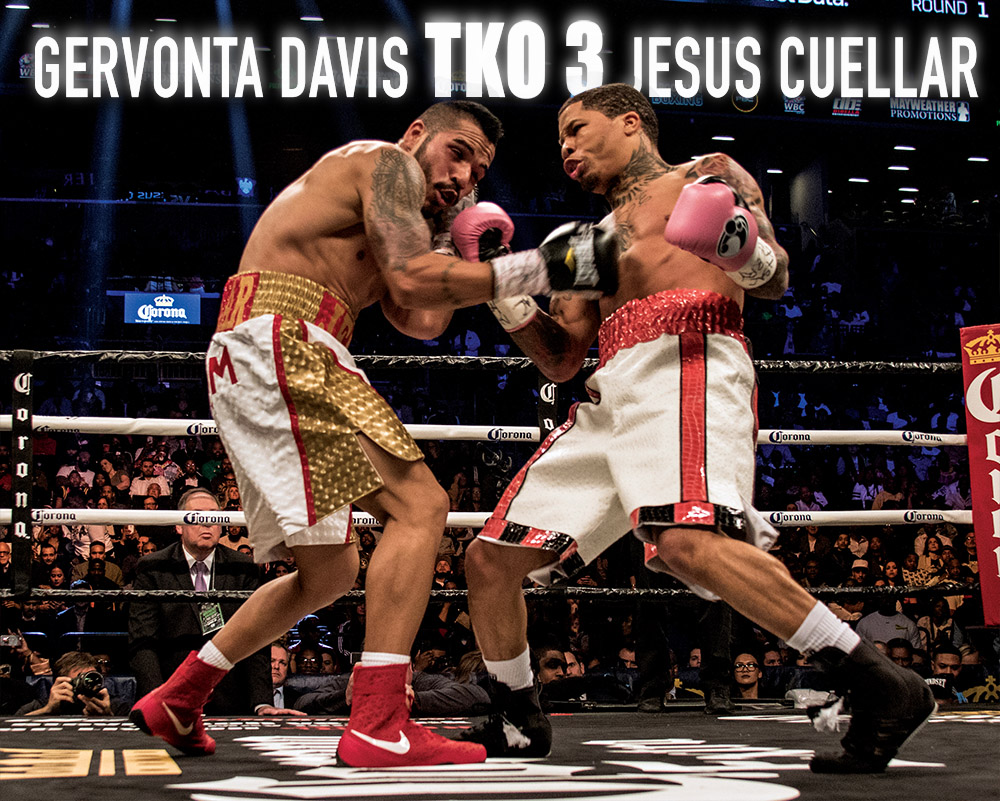 April 21, Barclays Center, Brooklyn, New York
April 21, Barclays Center, Brooklyn, New York
Gervonta Davis is gifted. He’s a very quick counterpuncher, excellent reflexes, fast in all four limbs, powerful, throws hooks with rib-cracking intent and spears uppercuts straight at the ceiling, and he’s very, very motivated. But at just 23 years old he’s still getting better, and his stoppage of Jesus Cuellar showcased another of his attributes-in-development: patience.
In his previous fight, ultimately an eighth-round knockout of Francisco Fonseca, Davis had disappointed by losing his IBF junior lightweight title on the scale. So this time, with the WBA title on the line, Davis was looking to show some discipline.
He put Cuellar down with a straight left to the body in Round 2. He might’ve followed that up with a swarm of bombs, raining down youth on his 31-year-old foe to draw the ref’s intervention, and in all likelihood that would’ve worked. But Cuellar – coming in with 16 months of inactivity following a split-decision loss to Abner Mares – was still a dangerous puncher and there was no need to get reckless, so Davis stayed focused and calm, punching hard but not stupidly for the remainder of the round. In the third he increased the pressure, put Cuellar down again with a bodyshot and then cleaned up with a flurry against the ropes, dropping the Argentine for a third time.
It was an intelligent, mature performance from Davis (20-0, 19 KOs), and yet another demonstration of the Baltimore native’s deep potential. In his post-fight interview he called out the winner of an expected matchup between Tevin Farmer and Billy Dib for his old IBF belt, now vacant: “Let’s unify, baby!”
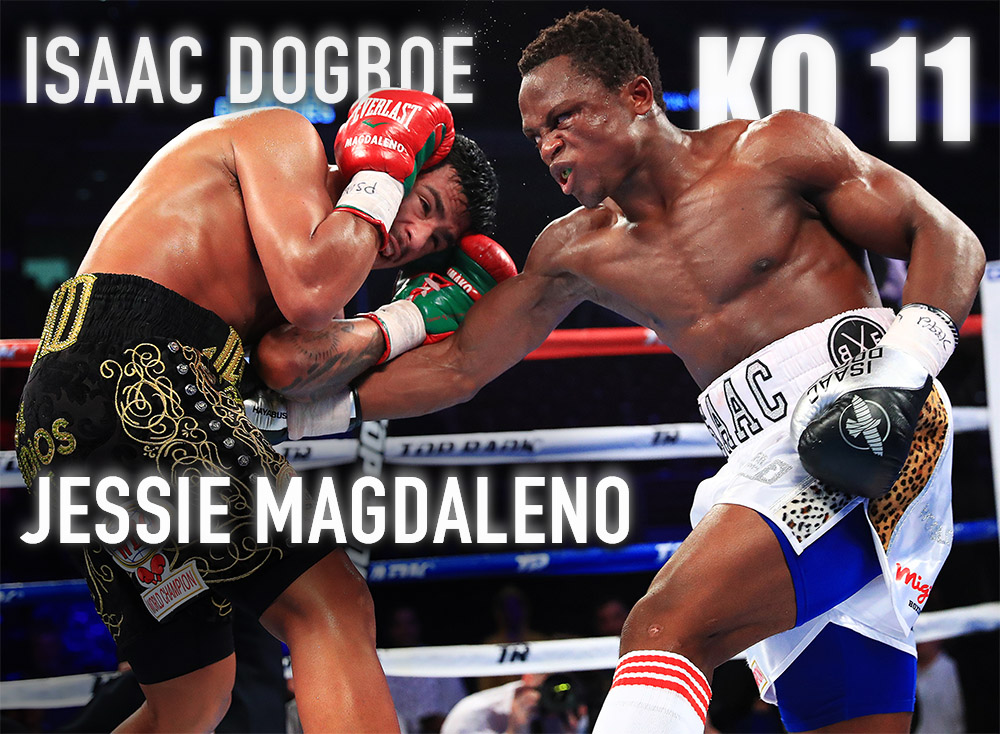 April 28, Liacouras Center, Philadelphia
April 28, Liacouras Center, Philadelphia
Isaac Dogboe walked a rough path to reach the ring he shared with Jessie Magdaleno in Philadelphia, and just moments after the opening bell it was clear the journey would end horribly. Halfway through the first round, Magdaleno, making the second defense of his junior featherweight belt and his first appearance in a year and six days, caught the onrushing Dogboe with a right-handed chop that staggered the Ghanaian, priming him for the left that put him on his back underneath the ropes. And just like that, children were left weeping inconsolably as all the hopes and dreams of an entire nation turned to ashes and… oh, he got up.
What followed was two undefeated fighters in a very entertaining scrap that firmly established Dogboe as a titleholder with a fan-friendly style. In Round 5, he ducked a hook and came from below to land a hybrid hookercut of his own, the force of the punch nearly separating both of Magdaleno’s feet from the canvas before he fell. There were multiple heavy exchanges in the rounds ahead, but ultimately the man from Las Vegas would fall twice more in the 11th before referee Benjy Esteves Jr. stepped in.
At the time of the stoppage, all three judges had Dogboe (19-0, 13 KOs) in the lead: 97-91, 95-93 and 96-91.
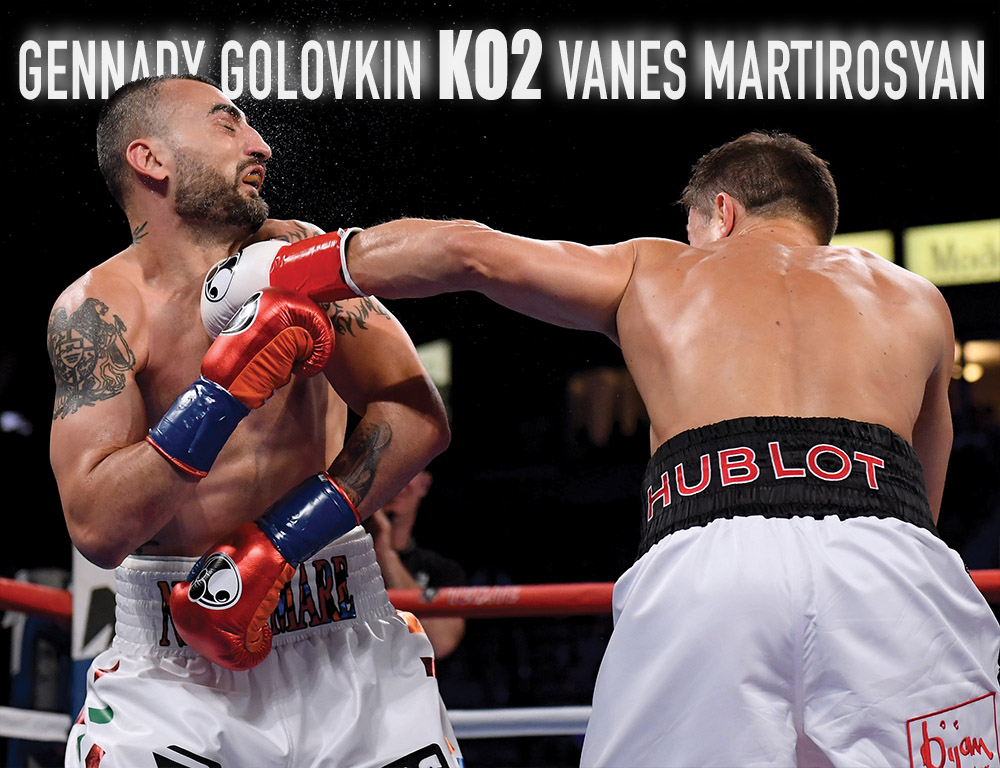 May 5, StubHub Center, Carson, California
May 5, StubHub Center, Carson, California
Everything was just a little off. In the preceding bout, “First Lady” Cecilia Braekhus had been knocked down for the first time in her career. When Golovkin entered the arena, the walk seemed to go on forever and lead nowhere, his entourage meandering through the audience as if lost in a maze. And then in the ring there was a really awkward “flag exchange” between Golovkin and Vanes Martirosyan, who we would later learn had told his wife to stay at home that night. Martirosyan’s trunks, random candy-colored shapes sprinkled on a white background, were slightly nauseating in their resemblance to a Christmas fruitcake. Considering the way things had gone in the buildup to Canelo Alvarez-Golovkin II, which was called off after Canelo tested positive for clenbuterol, it seemed not only possible but likely that a member of Team GGG had uncovered some kind of cursed relic while on a training run in the mountains of Big Bear.
There was also a sense of real frustration emanating from Golovkin, a result of the unified middleweight champion being dragged through a draining promotion only to lose millions of dollars and be forced to salvage the date by fighting a man who hadn’t been in a ring for two years and had rarely strayed above 154. Not to disparage Martirosyan; he’s a world-class fighter, a 2004 Olympian with the guts to accept the assignment, and he even caught GGG a few times in the first round.
Describing the ending, though, is like trying to describe the individual boulders in an avalanche. Golovkin’s final assault would’ve put dents in a refrigerator. Martirosyan (36-4-1, 21 KOs), a longtime resident of the Wild Card Boxing Club and overall veteran of the L.A. gym scene, said they were the hardest punches he’d ever felt. Meaning the pro-GGG fans got exactly what they came for and all was well. Curse lifted.
Golovkin (38-0-1, 34 KOs) was of course pressed by HBO’s Max Kellerman to talk about Canelo after the fight, and the Kazakhstani icon was understandably reluctant to commit to anything. “I want everybody,” he said. “Doesn’t matter for me with who.”
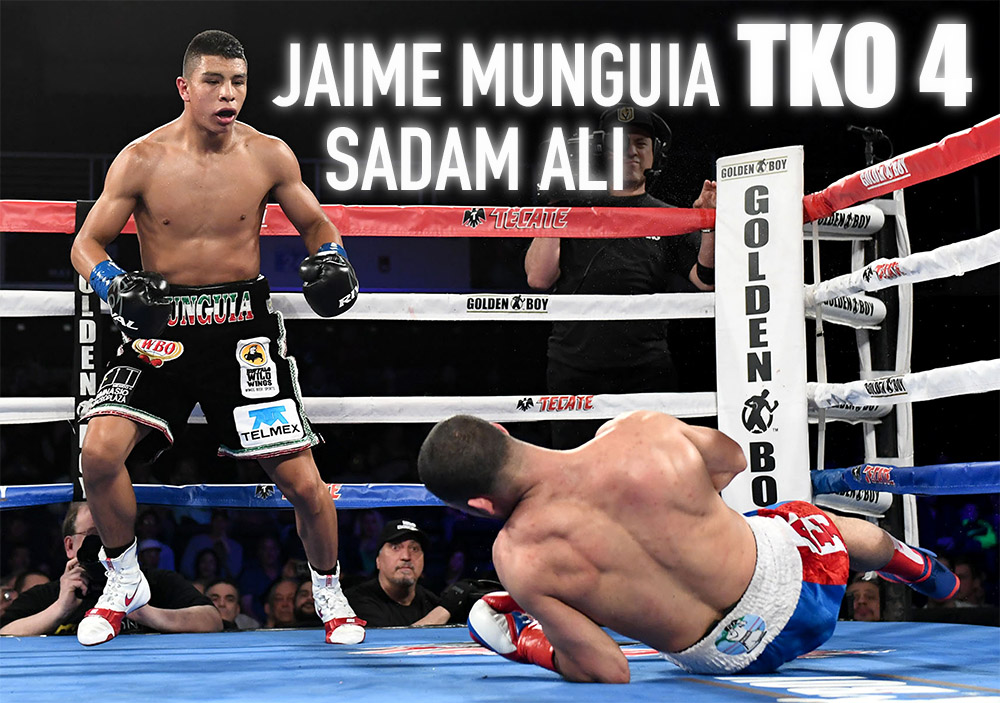 May 12, Turning Stone Resort & Casino, Verona, New York
May 12, Turning Stone Resort & Casino, Verona, New York
If mercy had been in greater supply, this would’ve been a shorter fight. It should’ve been shorter, at least by a round, but trainer Andre Rozier, the ringside doctor and referee Gary Rosato (who was visibly the most uncomfortable about it) somehow sent Sadam Ali back – twice – to face a dangerous, larger opponent in a fight that was already lost.
It was THE RING’s 2017 Upsetter/Comebacker of the Year fighting the Prospect of the Year, with Ali looking to prove that he was the reason for his retirement party-pooping victory over Miguel Cotto – not Cotto’s diminished skills – and the 21-year-old Munguia, fighting for only the second time outside of Mexico, just trying to prove he belonged in an HBO headliner.
Munguia (29-0, 25 KOs) floored the Brooklynite with a left hook about a minute into the opening round, and a right hand scored another knockdown a minute later. A dazed Ali (26-2, 14 KOs) survived the final seconds of the round and then wobbled back to his corner to take a seat. It had been a telling three minutes, though. Ali seemingly worked his way back into the fight in Round 2, but was floored again at the end of the session, and it was crystal clear his speed and skills were ineffective against Munguia’s power. Asked in his corner if he knew what round it was, he failed the test.
Even if those around him also failed, though, Ali’s will was solid and he continued to do what he could to win as long as he was told to do so. Before Round 4 there was some obvious disagreement over whether to let him fight on, but he did so until the fourth knockdown, which drew an immediate stoppage.
What was proven most of all that night is that Munguia, who took home the WBO junior middleweight belt, knows how to deliver a hellacious beating. But give credit for this: Unlike Golovkin, who ended up with an opponent far less challenging than the one who dropped out, Ali accepted a late replacement for Liam Smith, who pulled out two weeks before the bell for medical reasons, and ended up with a monster. The twist there is that Munguia was almost GGG’s opponent instead of Martirosyan, but the Nevada Athletic Commission wouldn’t approve the matchup.

Brian Harty can be reached at [email protected]
Cecilia Braekhus talks about her HBO debut: a tougher-than-expected 10-round decision over Kali Reis.

